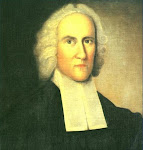Here is some teaching I have developed on the covenants of the Bible, based on the “new covenant” passage in Jeremiah 31:31-34.
· Jeremiah 31:31- YHWH promises that at some indeterminate time in the future, he is going to “make a new covenant” with his people. Let us get at the meaning of this key phrase by answering the following questions about it.
o #1- When will YHWH bring about this new covenant?
§ He says he will do so in days to come, meaning an undefined time in the future.
§ Jesus said at the time of the Last Supper with his disciples that the new covenant was coming into effect with his crucifixion the following day (Luke 22:20; see also 1 Corinthians 11:25).
§ Hebrews 8 quotes Jeremiah 31:31-34 and adds that with the advent of the new high priesthood of Jesus Christ, the new covenant of this passage has now come into effect.
o #2- What is a covenant?
§ My working definition of “covenant” is “an agreement between two parties that stipulates the terms of their relationship.” In the ancient world most covenants were made between a stronger party (like a local king) and a weaker party (like a farmer needing that king’s protection). One Bible scholar thus defines “covenant” more specifically as “a relationship between persons, begun by the sovereign determination of the greater party, in which the greater commits himself to the lesser in the context of mutual loyalty, and in which mutual obligations serve as illustrations of that loyalty.” (Michael D. Williams, Far as the Curse is Found: the Covenant Story of Redemption (Phillipsburg, N.J.: Presbyterian and Reformed, 2005), 45-46.)
o #3- What are the covenants of the Bible? (I am setting forth in this section one classic position on the covenants, which is the position espoused by Reformed theology. Many Bible scholars who love Scripture would set forth a different framework for the covenants.)
§ The covenant of redemption is the agreement among the three Persons of the Trinity, made in eternity past, to redeem humanity through the life, death, and resurrection of the second Person of the Godhead (John 17:2, 6; Philippians 2:8; Isaiah 53:10; etc.).
§ The covenant of works (or covenant of Creation) is the agreement God entered into with Adam, as the head of the human race, the terms of which were that if human beings would obey the Lord’s commands, he would bless us, and if we disobeyed, he would punish us (Hosea 6:7; Romans 5:12-21; 7:10; 10:5; Genesis 1:28-30; 2:16-17; etc.).
· The problem is, of course, that because all human beings are sinners who sin (Romans 3:23), none of us can make ourselves right with God through the covenant of works.
§ The covenant of grace is the agreement God has entered into with all of his people of all times, whereby he saves us by his grace alone, through faith alone, in Christ alone, in such a way that he is eternally our God, and we are eternally his people (v. 33; Leviticus 26:12; Revelation 21:3; Jeremiah 24:7; 30:22; Ephesians 1:4-5; 2:8-9; Romans 3:21-26; etc.). (For this discussion on the covenant of grace I am indebted to Wayne Grudem, Systematic Theology (Grand Rapids, Mich.: Zondervan, 1994), 519-22.)
· My understanding is that both the old covenant and the new covenant are different phases (or dispensations) of the one overall covenant of grace. I would also argue that God’s covenant with Abraham to give his people land and make them numerous (Genesis 15:1-21; 17:1-27) is part of the covenant of grace, as is God’s promise to King David to grant him an heir who would have an eternal reign over the people of God (2 Samuel 7:1-29).
· The old covenant is specifically the phase of the covenant of grace that included the Law God gave through Moses to his people, with all its ceremonies and observances (2 Corinthians 3:14).
· The old covenant Law was a product of God’s grace to his people (Exodus 20:1-2). The giving of the Law did not nullify the grace of God in his covenant with Abraham (Genesis 15:6; Galatians 3:16-18). The old covenant ceremonies looked forward to the new covenant realities. For example, the animal sacrifices of the old covenant looked forward to the once-for-all-times sacrifice of Jesus on the cross for the sins of his people (Hebrews 10:1-4).
· Here is a great irony of the covenant of grace. Christians are able to be parties to the covenant of grace because Jesus Christ the God-man kept on our behalves the covenant of works! Jesus never sinned. He perfectly kept all of God’s law all the time (2 Corinthians 5:21; 1 Peter 1:19; etc.). When God saves a sinner by justifying that sinner, God credits to that sinner the righteousness of Jesus, which means the Lord imputes to that sinner Jesus’ keeping of the covenant of works (2 Corinthians 5:21; Romans 4:1-12; etc.). In this sense we are saved not just by the covenant of grace but also the covenant of works—Jesus’ keeping of the covenant of works on our behalves!
§ #4- Who are the parties to the new covenant?
· Verse 31 says the parties are God on the one hand and “the house of Israel and the house of Judah” on the other hand.
· The New Testament makes it clear that the phrase “the house of Israel and the house of Judah” means “all believers living after the time of the death of Jesus on the cross and the pouring out of the Holy Spirit at the day of Pentecost” (Luke 22:20; 1 Corinthians 11:25; Hebrews 8:1-13; 2 Corinthians 3:1-18).
· We should not be surprised at this identification of the new covenant and the church age, because the New Testament calls Christians the “son of Abraham” (Romans 4:13-25; Galatians 3:7-9).
